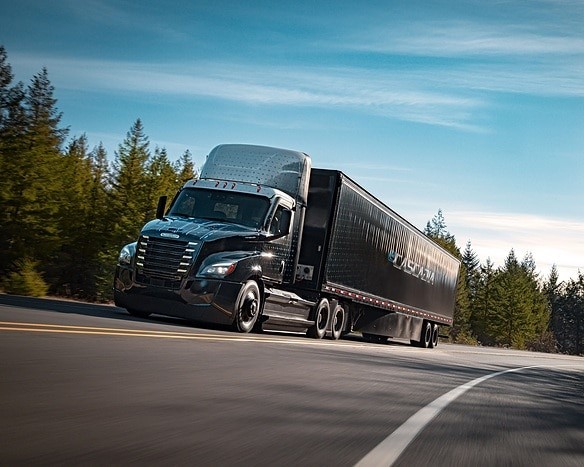In a significant leap towards the future of commercial trucking, Daimler Truck introduced its battery-electric autonomous Freightliner eCascadia technology demonstrator at this year’s ACT Expo. This unveiling provided attendees with a glimpse into the potential evolution of the trucking industry, blending zero-emission technology with autonomous driving capabilities.
The showcased Freightliner eCascadia is based on the production model of the battery-electric Freightliner eCascadia. It is equipped with advanced autonomous driving software developed by Torc Robotics and the latest Level 4 sensor and computing technology. Daimler Truck is using this model for research and advanced engineering purposes, aiming to eventually offer these cutting-edge technologies to commercial fleets.
“By combining zero-emission and autonomous technologies in one product, we are testing solutions for challenges our customers are likely to face in the future,” said John O’Leary, president and CEO of Daimler Truck North America. “We want to give them choices that allow them to do what they do best: keep the world moving today and well into the future. That takes a lot of foresight, questioning, testing, learning, improving, and co-creating with our customers years in advance to ultimately find the right solution. This truck is a great example of the beginning of that development process.”
Advancing towards autonomous trucking
Currently, the autonomous Freightliner eCascadia is being tested in hub-to-hub applications. The truck’s primary goal is to autonomously navigate between freight centers along U.S. highway corridors, thereby exploring the synergy between zero emissions and autonomous infrastructure. This could potentially integrate charging infrastructure and autonomous freight hubs, allowing simultaneous charging and loading to enhance efficiency for carriers.
“Together with Torc, we are making significant progress towards introducing autonomous trucks in the U.S. by 2027,” said Joanna Buttler, Head of Global Autonomous Technology Group at Daimler Truck. “While we target autonomous trucks with conventional propulsion technology for this first market launch, we always look further into the future. We will employ an iterative approach to the development, testing, and optimization of autonomous-electric technology, while exploring the most promising use cases in collaboration with our fleet customers.”
Historical context and future goals
Daimler Truck has been at the forefront of developing and testing autonomous truck technology since 2015, starting with the Freightliner Inspiration Truck, the first licensed SAE Level 2 autonomous commercial truck to operate on public highways in the United States. The company’s ambitious goal is to introduce production SAE Level 4 autonomous trucks in the U.S. market by 2027.
Over the past year, Daimler Truck’s technology partner Torc has been testing autonomous-ready Freightliner Cascadia trucks in real-world scenarios with selected logistics companies such as Schneider and C.R. England. These trucks have successfully moved customer freight autonomously on a test route between Phoenix and Oklahoma City.
The road ahead
The introduction of the autonomous electric Freightliner eCascadia is not just a technological milestone but a significant step towards a more efficient and sustainable future for the trucking industry. The iterative development process and close collaboration with fleet customers are essential to refine these technologies and ensure they meet the practical needs of the market.
Daimler Truck’s commitment to pioneering these innovations reflects the company’s foresight and dedication to transforming the commercial trucking landscape. As the industry moves towards an era where zero-emission and autonomous trucks become the norm, Daimler Truck aims to lead the charge, setting new standards for efficiency, safety, and sustainability.
The future of trucking is rapidly evolving, and with initiatives like the autonomous electric Freightliner eCascadia, Daimler Truck is poised to drive significant advancements. This not only promises to revolutionise how goods are transported but also to address critical environmental and operational challenges faced by the logistics industry today.


